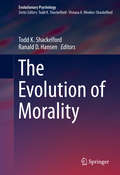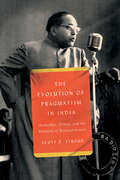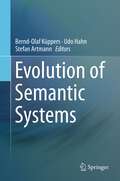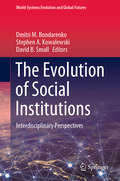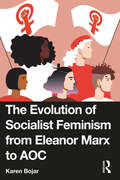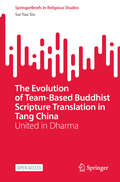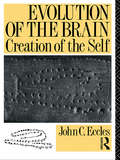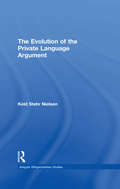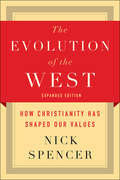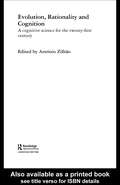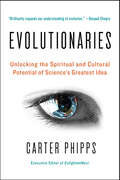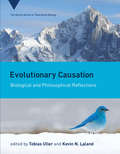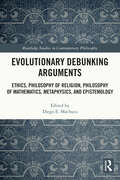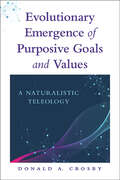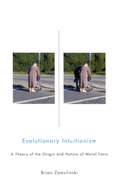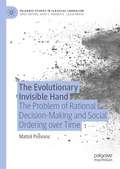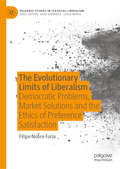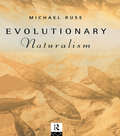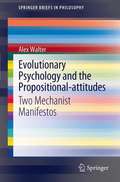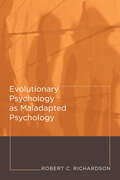- Table View
- List View
The Evolution of Morality
by Todd K. Shackelford Ranald D. HansenThis interdisciplinary collection presents novel theories, includes provocative re-workings of longstanding arguments, and offers a healthy cross-pollination of ideas to the morality literature. Structures, functions, and content of morality are reconsidered as cultural, religious, and political components are added to the standard biological/environmental mix. Innovative concepts such as the Periodic Table of Ethics and evidence for morality in non-human species illuminate areas for further discussion and research. And some of the book's contributors question premises we hold dear, such as morality as a product of reason, the existence of moral truths, and the motto "life is good. " Highlights of the coverage: The tripartite theory of Machiavellian morality: judgment, influence, and conscience as distinct moral adaptations. Prosocial morality from a biological, cultural, and developmental perspective. The containment problem and the evolutionary debunking of morality. A comparative perspective on the evolution of moral behavior. A moral guide to depravity: religiously-motivated violence and sexual selection. Game theory and the strategic logic of moral intuitions. The Evolution of Morality makes a stimulating supplementary text for advanced undergraduate and graduate courses in the evolutionary sciences, particularly in psychology, biology, anthropology, sociology, political science, religious studies, and philosophy
The Evolution of Pragmatism in India: Ambedkar, Dewey, and the Rhetoric of Reconstruction
by Scott R. StroudThe story of how the Indian reformer Bhimrao Ambedkar reimagined John Dewey’s pragmatism. In The Evolution of Pragmatism in India, Scott R. Stroud delivers a comprehensive exploration of the influence of John Dewey’s pragmatism on Bhimrao Ambedkar, architect of the Republic of India’s constitution. Stroud traces Ambedkar’s development in Dewey’s Columbia University classes in 1913–1916 through his final years in 1950s India when he rewrote the story of Buddhism. Stroud examines pragmatism’s influence not only on the philosophical ideas underpinning Ambedkar’s fight against caste oppression but also how his persuasive techniques drew on pragmatism’s commitment to reconstruction and meliorism. At the same time, Stroud is careful to point out the ways that Ambedkar pushed back against Dewey’s paradigm and developed his own approach to challenges in India. The result is a nuanced study of one of the most important figures in Indian history.
Evolution of Semantic Systems
by Bernd-Olaf Küppers Stefan Artmann Udo HahnComplex systems in nature and society make use of information for the development of their internal organization and the control of their functional mechanisms. Alongside technical aspects of storing, transmitting and processing information, the various semantic aspects of information, such as meaning, sense, reference and function, play a decisive part in the analysis of such systems. With the aim of fostering a better understanding of semantic systems from an evolutionary and multidisciplinary perspective, this volume collects contributions by philosophers and natural scientists, linguists, information and computer scientists. They do not follow a single research paradigm; rather they shed, in a complementary way, new light upon some of the most important aspects of the evolution of semantic systems. Evolution of Semantic Systems is intended for researchers in philosophy, computer science, and the natural sciences who work on the analysis or development of semantic systems, ontologies, or similar complex information structures. In the eleven chapters, they will find a broad discussion of topics ranging from underlying universal principles to representation and processing aspects to paradigmatic examples.
The Evolution of Social Institutions: Interdisciplinary Perspectives (World-Systems Evolution and Global Futures)
by Dmitri M. Bondarenko Stephen A. Kowalewski David B. SmallThis book presents a novel and innovative approach to the study of social evolution using case studies from the Old and the New World, from prehistory to the present. This approach is based on examining social evolution through the evolution of social institutions. Evolution is defined as the process of structural change. Within this framework the society, or culture, is seen as a system composed of a vast number of social institutions that are constantly interacting and changing. As a result, the structure of society as a whole is also evolving and changing. The authors posit that the combination of evolving social institutions explains the non-linear character of social evolution and that every society develops along its own pathway and pace. Within this framework, society should be seen as the result of the compound effect of the interactions of social institutions specific to it. Further, the transformation of social institutions and relations between them is taking place not only within individual societies but also globally, as institutions may be trans-societal, and even institutions that operate in one society can arise as a reaction to trans-societal trends and demands. The book argues that it may be more productive to look at institutions even within a given society as being parts of trans-societal systems of institutions since, despite their interconnectedness, societies still have boundaries, which their members usually know and respect. Accordingly, the book is a must-read for researchers and scholars in various disciplines who are interested in a better understanding of the origins, history, successes and failures of social institutions.
The Evolution of Socialist Feminism from Eleanor Marx to AOC
by Karen BojarThe Evolution of Socialist Feminism from Eleanor Marx to AOC traces the intersection of feminism and socialism as it has played out in the socialist movements arising in Europe and North America in the nineteenth through early twenty-first centuries. From well-known figures in the history of socialism, such as Rosa Luxemburg, Sylvia Pankhurst, and Angela Davis, to lesser-known individuals including Claudia Jones, Sheila Rowbotham, and Zillah Eisenstein, this book examines the socialist feminists who have been among the most powerful voices insisting on freedom of expression and participatory democracy within the socialist movement as well as within the larger society. It considers how these figures contributed to what has become a twenty-first-century multiracial grassroots socialist feminist movement led by young women of color, playing a major role in radical movements across the globe.The Evolution of Socialist Feminism from Eleanor Marx to AOC is an important text for undergraduate students of politics, sociology, and gender studies, as well as for the general reader.
The Evolution of Team-Based Buddhist Scripture Translation in Tang China: United in Dharma (SpringerBriefs in Religious Studies)
by Sai Yau SiuOpen Access This open-access book provides a concise analysis of the apex of team-based translation of Buddhist scriptures during the Tang Dynasty, initiated by the notable gathering of translation experts led by Prabhākaramitra. Showcasing the diverse and innovative strategies of translators who joined forces to surmount barriers, this work highlights how their collaborative translation efforts facilitated the spread of Buddhist teachings throughout China. This book brings to light the often overlooked yet crucial roles of these translation teams and examines their organizational structures, translation processes, and the distinct roles of individual members, offering critical insights into the cultural and religious fabric of the period. By enhancing our understanding of the complex dynamics within these institutions, this work also addresses a significant gap in the historical study of sūtra translation in medieval China. It is an essential resource for scholars, students, and enthusiasts of Buddhism, translation studies, and Chinese history.
Evolution of the Brain: Creation Of The Self
by John C. EcclesSir John Eccles, a distinguished scientist and Nobel Prize winner who has devoted his scientific life to the study of the mammalian brain, tells the story of how we came to be, not only as animals at the end of the hominid evolutionary line, but also as human persons possessed of reflective consciousness.
The Evolution of the Private Language Argument (Ashgate Wittgensteinian Studies)
by Keld Stehr NielsenThe Evolution of the Private Language Argument presents a continuous view of modern analytical philosophy by telling the history of one of its central strands. It is an in-depth history of this well known philosophical argument, the evolution of Wittgenstein's thoughts and its influence on analytical philosophy of mind and language. Nielsen looks at early discussions of the private language argument in the Vienna Circle and the influence of Wittgenstein's ideas and examines the relation between the early and later Wittgenstein on this subject. He discusses which influential versions of the private language argument have been presented in the fifty years since Philosophical Investigations was published and how they relate to Wittgenstein's thoughts, and considers how the role and the interpretation of the argument, and Wittgenstein's philosophy, changed along with changes in the conception of the nature of analytic philosophy.
Evolution of the Social Contract
by Brian SkyrmsIn this pithy and highly readable book, Brian Skyrms, a recognised authority on game and decision theory, investigates traditional problems of the social contract in terms of evolutionary dynamics. Game theory is skilfully employed to offer new interpretations of a wide variety of social phenomena, including justice, mutual aid, commitment, convention and meaning. The author eschews any grand, unified theory. Rather, he presents the reader with tools drawn from evolutionary game theory for the purpose of analysing and coming to understand the social contract. The book is not technical and requires no special background knowledge. As such, it could be enjoyed by students and professionals in a wide range of disciplines: political science, philosophy, decision theory, economics and biology.
The Evolution of the West: How Christianity Has Shaped Our Values
by Nick SpencerWhat has Christianity ever done for us? A lot more than you might think, as Nick Spencer reveals in this fresh exploration of our cultural origins. <P><P>Looking at the big ideas that characterize the West, such as human dignity, the rule of law, human rights, science, and even, paradoxically, atheism and secularism,he traces the varied ways in which many of our present values grew up and flourished in distinctively Christian soil. <P><P>Always alert to the tensions and mess of history, and careful not to overstate or misstate the Christian role in shaping our present values, Spencer shows us how a better awareness of what we owe to Christianity can help us as we face new cultural challenges.
Evolution, Rationality and Cognition: A Cognitive Science for the Twenty-First Century (Routledge Studies in the Philosophy of Science)
by António ZilhãoEvolutionary thinking has expanded in the last decades, spreading from its traditional stronghold – the explanation of speciation and adaptation in biology - to new domains. Fascinating pieces of work, the essays in this collection attest to the illuminating power of evolutionary thinking when applied to the understanding of the human mind. The contributors to Cognition, Evolution and Rationality use an evolutionary standpoint to approach the nature of the human mind, including both cognitive and behavioural functions. Cognitive science is by its nature an interdisciplinary subject and the essays in this collection investigate the workings of the mind through a variety of disciplines including the philosophy of science, the philosophy of mind, game theory, robotics and computational neuroanatomy. Topics covered range from general methodological issues to long-standing philosophical problems such as how rational human beings actually are. With contributions from leading experts in the areas involved, this book will be of interest across a number of fields, including philosophy, evolutionary theory and cognitive science.
Evolutionaries: Unlocking the Spiritual and Cultural Potential of Science's Greatest Idea
by Carter PhippsThis survey of science, religion and philosophy by an Integral thought leader “brilliantly expands our understanding of evolution” (Deepak Chopra).Blending cutting-edge ideas with spiritual insights, Evolutionaries is the first popular presentation of an emerging school of thought called “evolutionary spirituality.” Carter Phipps, the former executive editor of EnlightenNext magazine, asserts that evolution is not only a scientific but also a spiritual idea in a book whose message has the power to bring new meaning and purpose to life as we know it. Readers will be fascinated and enlightened by Evolutionaries, a book which Deepak Chopra says “is going to help create a worldview that will influence our vision of the future direction of evolution and also our role in consciously participating in it.”“A profound and profoundly important new work.” —Ken Wilber, author of A Brief History of Everything and The Integral Vision “No one has their head and heart around the full range of evolutionary worldviews like Carter Phipps.” —Reverend Michael Dowd, author of Thank God for Evolution “A significant contribution.” John F. Haught, Senior Fellow at Georgetown University's Woodstock Theological Center and Former Chair and Professor of the Department of Theology at Georgetown University“It would be hard to find a better guide into this fascinating conversation than Carter Phipps’s Evolutionaries.” —Brian Swimme, Ph.D, Director of the Center for the Story of the Universe and Professor at the California Institute of Integral Studies “Thoughtful and provocative.” —Kirkus Reviews“Phipps’s writing projects a palpable sense of positivity and excitement for what is to come.” —Publishers Weekly
Evolutionary Causation: Biological and Philosophical Reflections (Vienna Series in Theoretical Biology #23)
by Tobias Uller Kevin N. LalandA comprehensive treatment of the concept of causation in evolutionary biology that makes clear its central role in both historical and contemporary debates.Most scientific explanations are causal. This is certainly the case in evolutionary biology, which seeks to explain the diversity of life and the adaptive fit between organisms and their surroundings. The nature of causation in evolutionary biology, however, is contentious. How causation is understood shapes the structure of evolutionary theory, and historical and contemporary debates in evolutionary biology have revolved around the nature of causation. Despite its centrality, and differing views on the subject, the major conceptual issues regarding the nature of causation in evolutionary biology are rarely addressed. This volume fills the gap, bringing together biologists and philosophers to offer a comprehensive, interdisciplinary treatment of evolutionary causation.Contributors first address biological motivations for rethinking evolutionary causation, considering the ways in which development, extra-genetic inheritance, and niche construction challenge notions of cause and process in evolution, and describing how alternative representations of evolutionary causation can shed light on a range of evolutionary problems. Contributors then analyze evolutionary causation from a philosophical perspective, considering such topics as causal entanglement, the commingling of organism and environment, and the relationship between causation and information.ContributorsJohn A. Baker, Lynn Chiu, David I. Dayan, Renée A. Duckworth, Marcus W Feldman, Susan A. Foster, Melissa A. Graham, Heikki Helanterä, Kevin N. Laland, Armin P. Moczek, John Odling-Smee, Jun Otsuka, Massimo Pigliucci, Arnaud Pocheville, Arlin Stoltzfus, Karola Stotz, Sonia E. Sultan, Christoph Thies, Tobias Uller, Denis M. Walsh, Richard A. Watson
Evolutionary Debunking Arguments: Ethics, Philosophy of Religion, Philosophy of Mathematics, Metaphysics, and Epistemology (Routledge Studies in Contemporary Philosophy)
by Diego E. MachucaRecent years have seen an explosion of interest in evolutionary debunking arguments directed against certain types of belief, particularly moral and religious beliefs. According to those arguments, the evolutionary origins of the cognitive mechanisms that produce the targeted beliefs render these beliefs epistemically unjustified. The reason is that natural selection cares for reproduction and survival rather than truth, and false beliefs can in principle be as evolutionarily advantageous as true beliefs. The present volume brings together fourteen essays that examine evolutionary debunking arguments not only in ethics and philosophy of religion, but also in philosophy of mathematics, metaphysics, and epistemology. The essays move forward research on those arguments by shedding fresh light on old problems and proposing new lines of inquiry. The book will appeal to scholars and graduate students interested in the possible skeptical implications of evolutionary theory in any of the above domains.
Evolutionary Debunking Arguments: Ethics, Philosophy of Religion, Philosophy of Mathematics, Metaphysics, and Epistemology (Routledge Studies in Contemporary Philosophy)
by Diego E. MachucaRecent years have seen an explosion of interest in evolutionary debunking arguments directed against certain types of belief, particularly moral and religious beliefs. According to those arguments, the evolutionary origins of the cognitive mechanisms that produce the targeted beliefs render these beliefs epistemically unjustified. The reason is that natural selection cares for reproduction and survival rather than truth, and false beliefs can in principle be as evolutionarily advantageous as true beliefs. The present volume brings together fourteen essays that examine evolutionary debunking arguments not only in ethics and philosophy of religion, but also in philosophy of mathematics, metaphysics, and epistemology. The essays move forward research on those arguments by shedding fresh light on old problems and proposing new lines of inquiry. The book will appeal to scholars and graduate students interested in the possible skeptical implications of evolutionary theory in any of the above domains.
Evolutionary Emergence of Purposive Goals and Values: A Naturalistic Teleology
by Donald A. CrosbyWhere do the purposes, values, and existential meanings of the world come from? For many, they are conferred on the world and on humans within the world by a supernatural, transcendent, personal divine creator and sustainer. For others, they result from a God or divine presence residing within nature. For still others, they give evidence of mind and spirit as primordial principles suffusing nature from the outset and in all of its forms. In Evolutionary Emergence of Purposive Goals and Values, Donald A. Crosby takes issue with each of these views. His thesis is that mind, meaning, purpose, and value come into existence with the evolutionary emergence of life, and that evolution itself gives evidence of the creative power of two primordial natural principles: matter-energy and time. There is no overarching purpose, value, or meaning of nature as such, but there is a plethora of such factors evident in the evolved life forms of nature here on earth. This fact is especially evident in the day-to-day experiences, aspirations, and concerns of us evolutionarily-evolved human beings. Purpose, meaning, and value are therefore gifts of evolutionary nature, not of any supernatural or non-natural principle, presence, or power.
Evolutionary Intuitionism
by Brian ZamulinskiEvolutionary Intuitionism presents a new evolutionary theory of human morality. Zamulinski explains the evolution of foundational attitudes, whose relationships to acts constitute moral facts. With foundational attitudes and the resulting moral facts in place, he shows how they ground a plausible normative morality, give answers to meta-ethical questions, and provide an account of moral motivation. He explains the nature of moral intuitions and, thus, of our access to the moral facts. He shows that the theory makes confirmed empirical predictions, including the observable variation in moral views. The combination of intuitionism and evolutionary ethics enables Zamulinski to overcome the standard objections to both.
Evolutionary Intuitionism: A Theory of the Origin and Nature of Moral Facts
by Brian ZamulinskiEvolutionary Intuitionism presents a new evolutionary theory of human morality. Zamulinski explains the evolution of foundational attitudes, whose relationships to acts constitute moral facts. With foundational attitudes and the resulting moral facts in place, he shows how they ground a plausible normative morality, give answers to meta-ethical questions, and provide an account of moral motivation. He explains the nature of moral intuitions and, thus, of our access to the moral facts. He shows that the theory makes confirmed empirical predictions, including the observable variation in moral views. The combination of intuitionism and evolutionary ethics enables Zamulinski to overcome the standard objections to both.
The Evolutionary Invisible Hand: The Problem of Rational Decision-Making and Social Ordering over Time (Palgrave Studies in Classical Liberalism)
by Matúš PošvancThe book presents a new theoretical approach to the description of economic phenomena over time. A realistic and meaningful description of economic phenomena over time is one of the basic preconditions for the success of any economic theory. The presented theoretical solution or proposal has two main characteristics. The first is a modification of the theory of subjective value in the form of the claim that one perceives the satisfaction of one's needs in the context of one's overall individual portfolio of goods. The causal relationship of the “old” theory in the form of “need is satisfied by good” is modified in terms of “sum of needs is satisfied by portfolio of goods (sum of goods)”. This is a small modification, which, however, brings several important elements to the description of economic phenomena over time. The old theoretical approach did not enable us to operate over time because of different value context of goods which is changing over time. However, the portfolio of goods is, in fact, a formally-logical homogeneous construction of the mind, which is applicable over time. The second characteristic is the anchoring of this modification of the theory of subjective value in evolutionary (intersubjective) apriorism. The book will be of interest to any Austrian and Mainstream Economists who deal with problems of description of economic phenomena in time. Also, for those involved in topics such as estimating of future, why entrepreneurs are successful or the problem of social ordering or equilibration and those who are interested in the new evolutionary approach to the emergence of criteria for rational decision-making.
The Evolutionary Limits of Liberalism: Democratic Problems, Market Solutions and the Ethics of Preference Satisfaction (Palgrave Studies in Classical Liberalism)
by Filipe Nobre FariaThis book assesses the evolutionary sustainability of liberalism. The book’s central claim is that liberal institutions ultimately weaken their social groups in the evolutionary process of inter-group competition. In this sense, institutions relying on the liberal satisfaction of preferences reveal maladaptive tendencies. Based on the model of multilevel selection, this work appraises the capacity of liberal democracy and free markets to satisfy preferences. In particular, the book re-evaluates public choice theory’s classic postulate that free markets are a suitable alternative to the shortcomings of western liberal democracies regarding preference satisfaction. Yet, the book concludes that free markets are not a solution to the problems of liberal democracy because both market and democratic liberal institutions rest on the liberal satisfaction of preferences, an ethic which hurts group evolutionary fitness. This volume is of interest to political theorists, evolutionary ethicists, political economists and to general readers interested in the future of liberalism.
Evolutionary Naturalism: Selected Essays
by Michael RuseFirst published in 1995. Routledge is an imprint of Taylor & Francis, an informa company.
Evolutionary Psychology and the Propositional-attitudes
by Alex WalterThe two essays provide a critical examination of theory and research in the field of evolutionary psychology. The view advanced here is that philosophical materialism and minimalist assumptions about adaptation serve Darwinian psychology better than the more popular alternative view that relies on cognitive dualism and propositional-attitude psychology to formulate evolutionary psychology theory. A commitment to cognitive dualism is destined to undermine the physical basis of behavior upon which evolutionary theory depends. Many evolutionary psychologists do not see this but are seduced by the easy way in which hypotheses can be formulated using the 'propositional-attitude' model. The challenge is to develop a materialistic and mechanistic approach to understanding human cognition and behavior, including linguistic and social behavior.
Evolutionary Psychology and the Propositional-attitudes: Two Mechanist Manifestos (SpringerBriefs in Philosophy)
by Alex WalterThe two essays provide a critical examination of theory and research in the field of evolutionary psychology. The view advanced here is that philosophical materialism and minimalist assumptions about adaptation serve Darwinian psychology better than the more popular alternative view that relies on cognitive dualism and propositional-attitude psychology to formulate evolutionary psychology theory. A commitment to cognitive dualism is destined to undermine the physical basis of behavior upon which evolutionary theory depends. Many evolutionary psychologists do not see this but are seduced by the easy way in which hypotheses can be formulated using the ‘propositional-attitude’ model. The challenge is to develop a materialistic and mechanistic approach to understanding human cognition and behavior, including linguistic and social behavior.
Evolutionary Psychology as Maladapted Psychology (Life and Mind: Philosophical Issues in Biology and Psychology)
by Robert C. RichardsonA philosopher subjects the claims of evolutionary psychology to the evidential and methodological requirements of evolutionary biology, concluding that evolutionary psychology's explanations amount to speculation disguised as results.Human beings, like other organisms, are the products of evolution. Like other organisms, we exhibit traits that are the product of natural selection. Our psychological capacities are evolved traits as much as are our gait and posture. This much few would dispute. Evolutionary psychology goes further than this, claiming that our psychological traits—including a wide variety of traits, from mate preference and jealousy to language and reason—can be understood as specific adaptations to ancestral Pleistocene conditions. In Evolutionary Psychology as Maladapted Psychology, Robert Richardson takes a critical look at evolutionary psychology by subjecting its ambitious and controversial claims to the same sorts of methodological and evidential constraints that are broadly accepted within evolutionary biology.The claims of evolutionary psychology may pass muster as psychology; but what are their evolutionary credentials? Richardson considers three ways adaptive hypotheses can be evaluated, using examples from the biological literature to illustrate what sorts of evidence and methodology would be necessary to establish specific evolutionary and adaptive explanations of human psychological traits. He shows that existing explanations within evolutionary psychology fall woefully short of accepted biological standards. The theories offered by evolutionary psychologists may identify traits that are, or were, beneficial to humans. But gauged by biological standards, there is inadequate evidence: evolutionary psychologists are largely silent on the evolutionary evidence relevant to assessing their claims, including such matters as variation in ancestral populations, heritability, and the advantage offered to our ancestors. As evolutionary claims they are unsubstantiated. Evolutionary psychology, Richardson concludes, may offer a program of research, but it lacks the kind of evidence that is generally expected within evolutionary biology. It is speculation rather than sound science—and we should treat its claims with skepticism.
